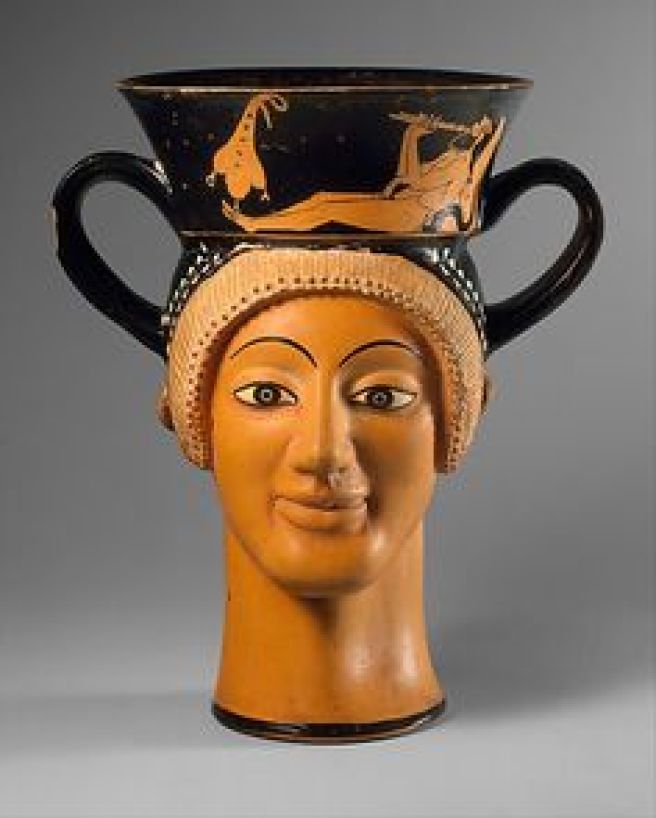From the Suda:
“Sardinian Laugh”: A proverb used for people who laugh at their own death. According to Demôn it developed from the fact that the Sardinians used to sacrifice the best and the oldest of their captives each year to Cronus as they laughed to display their courage. Timaios, on the other hand, claims that men who had lived a long enough time were in the habit of laughing when they were pushed by their sons into the trenches in which they would bury them. But others claim the saying comes from smiling with devious intent.
Others say—and this includes Cleitarchus—that when they place a small child in Kronos’ hand in Carthage during their most important prayers (a bronze statue is set out with hands stretched out over a cooking pot) and after they light the fire, the boy seems to laugh as he is shriveled by the fire. But Simonides says that when the Sardinians were not willing to hand over Talos—the fabricated man—to Minos, that Talos leapt into the fire, because he was bronze, clutched them to his chest and killed them as they gasped for air.
Silenus argues in the fourth book of his On the Syracusans that there is a sweet plant similar celery which when people eat it they bite off segments of their own faces. There are also some who say that this is to laugh at danger. This is what happens when Homer says that “shining Odysseus grinned sardonically” and in other places,” she laughed with her lips, but she was not pleased under her dark brows”
Σαρδάνιος γέλως: παροιμία ἐπὶ τῶν ἐπ’ ὀλέθρῳ τῷ σφῶν αὐτῶν γελώντων· ἣν Δήμων μὲν διαδοθῆναι, ὅτι οἱ Σαρδόνα κατοικοῦντες αἰχμαλώτων τε τοὺς καλλίστους καὶ πρεσβυτέρους ὑπὲρ ο′ ἔτη τῷ Κρόνῳ ἔθυον, γελῶντας, ἕνεκα τοῦ τὸ εὔανδρον ἐμφῆναι (τουτ έστιν ἀνδρεῖον). Τίμαιος δέ, τοὺς ἱκανὸν βεβιωκότας χρόνον ἐν Σαρδοῖ συνωθουμένους σχίζαις ὑπὸ τῶν υἱῶν εἰς ὃν ἔμελλον θάπτεσθαι βόθρον γελᾶν. οἱ δέ, ἀπὸ τοῦ σεσηρέναι μετὰ ἀνίας. καί φασιν ἄλλοι τε καὶ Κλείταρχος, ἐν Καρχηδόνι ἐν ταῖς μεγάλαις εὐχαῖς παῖδα ταῖς χερσὶ τοῦ Κρόνου ἐπιτιθέντας (ἵδρυται δὲ χαλκοῦς, προβεβλημένας ἔχων τὰς χεῖρας ὑφ’ ᾧ κρίβανος), ἔπειτα ὑποκαίειν· τὸν δὲ συνελκόμενον ὑπὸ τοῦ πυρὸς δοκεῖν γελᾶν. Σιμωνίδης δὲ Τάλων τὸν ἡφαιστότευκτον Σαρδωνίους οὐ βουλομένους περαιῶσαι πρὸς Μίνῳα, εἰς πῦρ καθαλλόμενον, ὡς ἂν χαλκοῦν, προστερνιζόμενον ἀναιρεῖν ἐπιχάσκοντας. Σιληνὸς δὲ ἐν δ′ τῶν περὶ Συρακούσας λάχανον εἶναι παρὰ Σαρδωνίοις ἡδύ, σελίνῳ ἐμφερές· οὗ τοὺς γευσαμένους τάς τε σιαγόνας καὶ τὰς σάρκας ἑαυτῶν ἀποδάκνειν. ἔνιοι δὲ τοὺς ἐπὶ κακῷ γελῶντας· ὡς καὶ ᾿Οδυσσέα φησὶν ῞Ομηρος· μείδησε δὲ δῖος ᾿Οδυσσεὺς Σαρδώνιον. καὶ ἐν ἄλλοις· ἡδὺ γέλασσε χείλεσσιν, οὐδὲ μέτωπον ἐπ’ ὀφρύσι κυανέῃσιν ἰάνθη.


Reblogged this on Talmidimblogging.